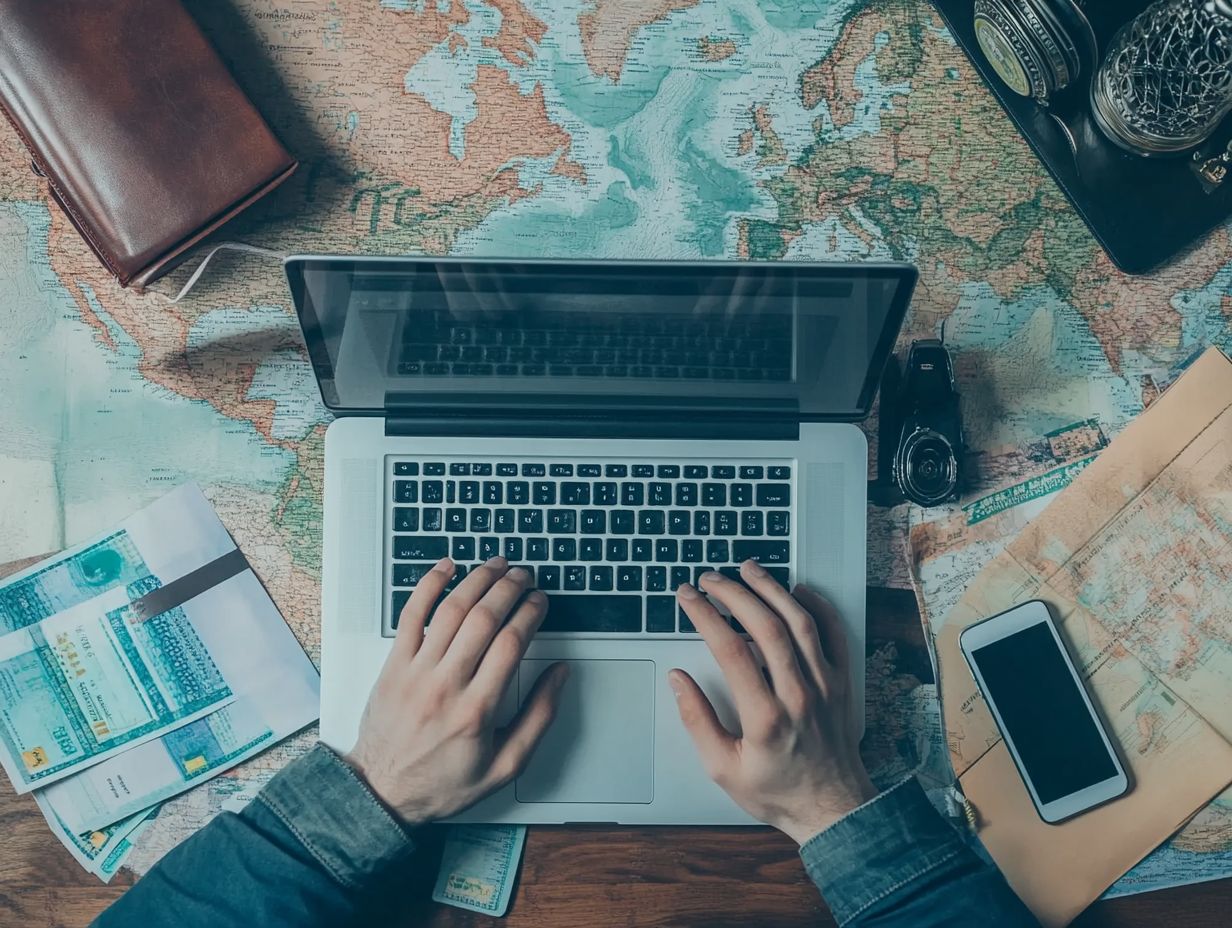How to Access My Funds Abroad?
Navigating international banking can seem overwhelming, especially when you’re traveling or residing abroad. Grasping how banks function across borders is essential for accessing your funds without a hitch.
This guide will walk you through several methods for accessing your money be it through ATMs, wire transfers, or international bank accounts. Key factors to consider include fees, exchange rates, and security.
Moreover, you’ll find useful tips for preparing for your travels and managing your finances while overseas. With this knowledge, you can travel with confidence.
Contents
- Key Takeaways:
- Understanding International Banking
- Options for Accessing Funds Abroad
- Considerations for Choosing a Method
- Preparing for International Travel
- Tips for Managing Funds Abroad
- Frequently Asked Questions
- 1. How can I access my funds abroad?
- 2. Can I use my debit or credit card to access my funds abroad?
- 3. How do I transfer my funds to an international bank account?
- 4. What is a prepaid travel card and how do I use it?
- 5. Are there any restrictions on accessing my funds abroad?
- 6. What should I do if I lose my debit or credit card while abroad?
Key Takeaways:
- Familiarize yourself with international banking practices to understand how your funds will be accessed and managed.
- Consider all options for accessing funds abroad, such as using ATMs, wire transfers, or opening an international bank account.
- When choosing a method, take into account fees, exchange rates, convenience, and security for the best experience abroad.
Understanding International Banking
Understanding international banking is essential for travelers who aim to manage their finances effectively while abroad. This intricate system involves several key components, including how banks function across borders and the availability of services like currency exchange.
The types of accounts that can help you access both local and overseas funds are also important. Familiarizing yourself with the details of using debit and credit cards is vital.
Grasp the implications of foreign transaction fees. Being aware of local bank branches will ensure a seamless financial experience as you explore the globe.
How Banks Operate Across Borders
Banks navigate international waters by forging strong relationships with local financial institutions, allowing for effortless currency exchange and access to local currency for travelers like you.
These partnerships play a pivotal role in streamlining international transactions, making remittances and fund transfers a breeze. By teaming up with local banks, they can offer you better exchange rates and lower transaction fees, ultimately enhancing your financial experience.
This synergy boosts operational efficiency and ensures that you have swift access to essential financial services without the headaches of bureaucratic delays.
This means you can travel with peace of mind, confident that your banking needs are covered, no matter where your adventures lead you.
Options for Accessing Funds Abroad
When you re traveling internationally, it s vital to have a range of options for accessing your funds to maintain financial flexibility and security. You can take advantage of ATMs to withdraw local currency, use credit and debit cards that minimize transaction fees, or even consider alternatives like traveler s checks for an added layer of security.
Each method comes with its own set of advantages and disadvantages, so assess factors such as your location and currency exchange rates. This way, you can determine the most efficient approach to accessing your money while abroad.
Using ATMs and Credit/Debit Cards
Utilizing ATMs and credit or debit cards is your ticket to conveniently accessing local currency while traveling. It allows for quick withdrawals and purchases without the burden of carrying excessive cash.
Follow these tips for a smooth experience: When searching for local ATMs, prioritize machines affiliated with well-known banks. This will help you minimize fees and enhance your safety.
Understanding foreign transaction fees is also vital; these fees can vary significantly by card issuer, so being informed can spare you from unexpected costs on each purchase.
Make it a point to inquire about your bank’s exchange rates and notify your financial institutions of your travel dates. Doing so can prevent any card issues while you’re abroad.
Keep these tips in mind to unlock hassle-free access to your funds!
Transferring Funds via Wire Transfer

Need to access funds while traveling? Wire transfers are a fast and safe way to get your money worldwide.
This method is reliable, especially for larger sums or emergency cash situations. It allows efficient transfers across borders with banking institutions.
Wire transfers use a global system for transferring money between banks, ensuring swift delivery of your funds. The speed and security make it a top choice for urgent financial needs.
Be aware of potential transaction fees. These can vary greatly depending on the banks involved and the amount you’re transferring.
Online banking makes initiating transfers easy, but double-check your account details. Errors can lead to delays or worse, funds ending up in the wrong hands.
Opening an International Bank Account
An international bank account is a smart choice for frequent travelers. It gives you easy access to local currency and helps avoid foreign transaction fees.
This account type offers benefits like seamless money transfers between accounts, especially when hopping from country to country. It often eliminates the need for currency exchanges, which can come with hidden charges.
Evaluate factors like the bank’s global presence and the currencies they support. Choosing the right account can streamline your finances, allowing you to focus on creating unforgettable memories.
Considerations for Choosing a Method
Choosing the best method to access funds abroad requires considering several key factors. Look at fees, exchange rates, convenience, and security.
Making informed choices ensures a smoother journey and maximizes your enjoyment.
Fees and Exchange Rates
Understanding transaction fees and exchange rates is vital. These factors can dramatically affect your budget and how much you can spend during your travels.
Be aware of various fees like ATM withdrawal charges and foreign transaction fees from banks. Exchange rates can also impact the value of your funds abroad.
To navigate these challenges, consider these strategies:
- Use local ATMs affiliated with your home bank.
- Choose credit cards that offer no foreign transaction fees.
- Compare exchange options before converting currencies.
By understanding these aspects, you can make informed decisions to protect your budget and enjoy your trip more.
Convenience and Security
Prioritizing convenience and security while managing funds abroad elevates your travel experience. It grants you peace of mind in unfamiliar places.
Be aware of potential risks linked to accessing cash in foreign locales. Use ATMs in well-lit, populated areas to reduce the chances of theft or fraud.
Check withdrawal fees, as some machines impose steep charges. Carry only a minimal amount of cash and rely on secure travel debit or credit cards for most purchases.
Familiarize yourself with local banking hours and options. This knowledge ensures smoother financial management and allows you to embrace your adventures with confidence.
Preparing for International Travel

Preparing for international travel requires careful planning. You need to ensure you have the right funds and easy access to money while abroad.
Notify your bank of your travel plans. This helps prevent security flags on your credit and debit cards.
Notify Your Bank and Check for Restrictions
Letting your bank know before you travel is crucial. This simple step keeps you from being stranded without cash.
Check for any rules about your accounts, such as transaction limits or foreign fees. A quick call or a look at your bank’s website can provide this information.
Consider setting up alerts for transactions. This way, you can easily monitor your accounts while enjoying your trip.
Carrying Multiple Forms of Payment
Using multiple payment methods ensures you always have funds available. This strategy gives you flexibility in different situations.
Cash, credit cards, debit cards, and traveler’s checks can help you navigate various circumstances. Local markets may prefer cash, but larger places often accept cards.
Diverse payment options protect you against issues. If one method fails, you have others to rely on.
This way, you can manage expenses effectively, as different currencies and fees may apply. Switching between options enhances your travel experience.
Tips for Managing Funds Abroad
Managing your funds abroad requires smart budgeting and careful tracking of expenses. This way, you maintain control of your finances and can enjoy your trip stress-free.
Budgeting and Tracking Expenses
Budgeting is essential for ensuring your funds last throughout your travels. Smart strategies can help you optimize your financial resources.
Establish a daily budget for accommodation, meals, activities, and emergencies. This helps you stay organized.
Mobile apps like Mint or YNAB make tracking expenses easy. Log your spending in real-time to keep a close eye on your cash flow.
Set aside a buffer fund for emergencies. This safety net protects you from unexpected surprises and helps ensure a smooth travel experience.
Keeping Your Information Safe

Keeping your financial information safe while traveling is essential to prevent identity theft and unauthorized access to your accounts.
Make it a habit to keep your data safe! Use secure online banking platforms that utilize encryption and two-factor authentication a way to add extra security, requiring a second form of identification to protect against cyber threats.
Actively monitoring your card activity helps you quickly spot any suspicious transactions. This enables prompt reporting to your financial institutions.
When handling cash and traveler s checks, being discreet and organized can significantly reduce risks.
By employing these strategies, you can fully enjoy your journeys while safeguarding your financial well-being.
Frequently Asked Questions
1. How can I access my funds abroad?
To access your funds abroad, you need a bank account in the country you are visiting or you can transfer your funds to an international bank account. It’s also helpful to learn how to manage finances abroad, as another option is to use a prepaid travel card that allows ATM withdrawals or purchases abroad.
2. Can I use my debit or credit card to access my funds abroad?
Yes, you can use your debit or credit card abroad. However, be aware of potential foreign transaction and ATM withdrawal fees. Always check with your bank beforehand to understand any fees or restrictions.
3. How do I transfer my funds to an international bank account?
You can transfer funds to an international bank account through wire transfers, online banking, or money transfer services. Research fees and exchange rates before choosing a method.
4. What is a prepaid travel card and how do I use it?
A prepaid travel card is a reloadable card where you can store multiple currencies. Load it with funds before your trip and use it for cash withdrawals or purchases. Make sure to check the exchange rates and fees associated with the card.
5. Are there any restrictions on accessing my funds abroad?
Some countries may restrict the amount of money you can bring in or take out. Always research specific laws and regulations to avoid any issues accessing your funds.
6. What should I do if I lose my debit or credit card while abroad?
If you lose your card abroad, contact your bank immediately to report it and request a replacement. They may provide an emergency cash advance or help you access your funds through other means.





